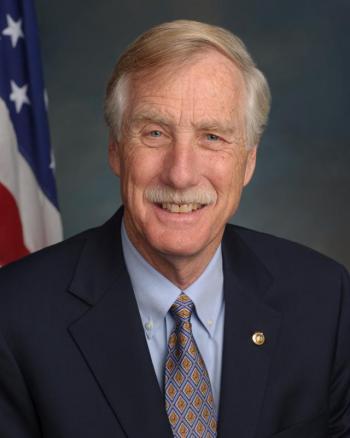King’s talks about state of D.C. with Penobscot Bay Chamber of Commerce
ROCKPORT — As Senator Susan Collins held forth on an amendment during an intelligence committee meeting, a senator from New Mexico quietly asked Senator Angus King (I-Maine), “Is there something in the water in Maine that gives people common sense?”
Yes, things are happening in Washington, King told members of the Penobscot Bay Regional Chamber of Commerce, Monday, May 23, during a talk at the Chamber breakfast series.
He cited bills passed for education, job training, and veterans affairs as Senate votes not so well known to the public get accomplished, in a world where controversy gets more coverage.
For example, a veterinarian from Dresden contacted King with a dilemma plaguing all large animal doctors in the nation. A consequence of a food and drug law prohibiting the transport of controlled substances kept vets from legally taking certain medications to the homes of their clients.
King shared the dilemma with a senator from Kansas, and the two created a bill to fix the issue. A unanimous vote in Congress sealed the docket.
But times have changed in Washington since 1972, when he served as chief counsel to the U.S. Senate Subcommittee on Alcoholism and Narcotics in the office of former Maine Senator William Hathaway.
According to King, a slight majority of current senate members have served for eight years or fewer. Twenty-six of those members, including himself, have served fewer than four years. And therein lies a problem.
Many people now in the U.S. Senate have never seen it really work, and there is a culture of failure.
“It’s like a high school football team that has never won a game in five years,” said King. “You sort of accept nonperformance as the norm. There are a lot of people who have only been there [in Washington] when it’s been nonperforming.”
In March 2013, two months into King’s term in office, a sequester occurred. Neither democrats nor republicans could get enough votes for their proposed bills. Following the stalemate, King expected leaders of each party to meet and negotiate. Instead, the entire issue was side-tabled, and everyone turned to other business.
Then another sequester came along. In the late spring, democrats and republicans each crafted bills attempting to curb an expected hike in student loan interest, from four percent to 6.8 percent.
Following this stalemate, King formed his own committee group of six senators. They negotiated a hybrid plan based on both party’s proposals that effectively dropped the interest rate to 3.7 percent, saving American students $50 billion over the next 10 years.
Though King and his group crafted the hybrid plan fairly easily, they still had to sell the plan to Congress during a culture which King refers to as “the death of compromise.”
According to King, compromise is now viewed as a deadly political offense that would cost a politician his seat. No human problem can be solved without compromise, listening, and give and take, he said.
King said that it’s fine to vote against pro or antiabortionists, or immigration, or gun control.
“But to vote against you because you talked to the other side about immigration, or you tried to find a solution...Just because of that, that is dangerous for the system.”
King quoted another senator who said: ‘I spend all my time during the week in Washington trying to convince people I’m not crazy. And then I go home on the weekends and try to convince my constituent that I am.’
Reach Sarah Thompson at news@penbaypilot.com.


























